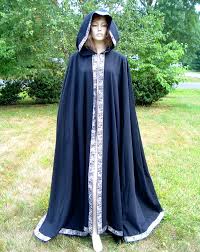记忆方法
1. originally "travelers' cape," literally "a bell," so called from the garment's bell-like shape.
2. clock => cloak.
3. 有一门武功叫“金钟罩”,是对此非常形象、生动的写照。
2. clock => cloak.
3. 有一门武功叫“金钟罩”,是对此非常形象、生动的写照。
中文词源
cloak 斗蓬
来自clock,因形似钟而得名。
英语词源
- cloak (n.)
- late 13c., "long, loose outer garment," from Old North French cloque (Old French cloche, cloke) "travelling cloak," from Medieval Latin clocca "travelers' cape," literally "a bell," so called from the garment's bell-like shape (the word is thus a doublet of clock (n.1)). An article of everyday wear in England through 16c., somewhat revived 19c. as a fashion garment. Cloak-and-dagger (adj.) attested from 1848, said to be ultimately translating French de cape et d'épée, suggestive of stealthy violence and intrigue.
Other "cloak and dagger pieces," as Bouterwek tells us the Spaniards call their intriguing comedies, might be tried advantageously in the night, .... ["Levana; or the Doctrine of Education," English translation, London, 1848]
- cloak (v.)
- c. 1500, from cloak (n.). Figuratively from 1540s. Related: Cloaked; cloaking.
权威例句
- 1. She was released from prison in a cloak and dagger operation yesterday.
- 在昨天的一次秘密行动中她从监狱获释。
- 2. Preparations for the wedding were made under a cloak of secrecy.
- 婚礼的准备工作是秘密进行的。
- 3. They left under the cloak of darkness.
- 他们在黑暗的掩护下离开了。
- 4. She threw a heavy woollen cloak over her shoulders.
- 她把一件厚重的羊毛斗篷披在肩上.
- 5. She is wearing a red cloak with a hood.
- 她穿着一件红色带兜帽的披风.
